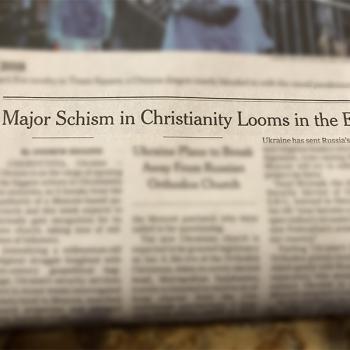The blogging world of United Methodist Clergy has exploded recently with the revelation that the Texas Annual Conference is floating a document that appears “ageist” in its suggestions as to who might or might not be encouraged to seek ordination there. I want to thank Jeremy at Hacking Christianity for this post which exposes the possible plans in the Texas Annual Conference for discouraging older people from entering the ordination process.
Now, there are lots of comments flying around. One, from someone who was part of creating the proposal, reminded us that we live in the real world and that, among other things, older clergy add to the health insurance burdens of all us the rest of us. This, of course, assumes that no younger clergy will find themselves in the midst of a horrific disease and will run up giant medical bills in response to it, a rather naive assumption.
But others are saying, and in my opinion more rightly, that just because someone senses a call to the ministry of the ordained doesn’t necessarily make them one of the chosen for this very complex and draining profession. Age, gender, able-bodiedness, race, etc. are not the issue.
Giftedness Must Match the Call
The issue is giftedness for the profession.
I wish that every person sitting on the various gatekeeper boards (SPRC’s, District Board of Ministries, Conference Board of Ordained Ministries), would take the time to read this compelling little novel called Cosmas or the Love of God.
Here’s a review:
Devout, sensitive, young Cosmas believes that he has a vocation to become a Trappist monk, but the reality of monastic life disappoints him deeply. Fellow monks are hard to live with. The life of the monastery seems worldly. He is disheartened by his own shortcomings and appalled by the weaknesses of others. If he can’t live the life, does that mean God isn’t calling him to it? What should he do? Many people—single, married, vowed, ordained—ask these same questions. Pierre de Calan explores them all in this exquisite tale of a man who learns that sanctity does not mean perfection.
Now, that statement in the review, “the reality of monastic life disappoints him deeply,” struck a nerve with me. The reality of the life of one in the ministry of the ordained surely has disappointed everyone to some degree.
Frankly, fellow clergy are hard to live with. The nature of the “career ladder” for pastoral moves, and a highly limited number of prime appointments makes us all competitors with one another more than colleagues in loving covenant.
“Worldly” is very much a word that describes The United Methodist Church. We are selling our souls down the river of numerical success. The “making of disciples of Jesus Christ for the transformation of the world” be damned. The process of discipleship simply gets in the way. It is too slow, too cumbersome, without glamour, and not at all remunerative. Seriously, no really effective discipler is going to make Time Magazine’s “25 Most Influential Christian Leaders” list.
We’ve Already Tried This
But none of that is the point. Here is the point:
The young, hotshot (male) clergy that the movin’ and shakin’ Conferences want and are actively promoting to prestigious pulpits look like clones of the very people who helped bring The UMC to the point where we are now: laboring under giant, smothering, expensive infrastructure that says, “More is better!” They are the ones who have proudly brought us to a situation where we are crushed under bureaucracy, burdened with an unworkable, impenetrable Book of Discipline, and dismayed by the fact that apparently only 15% of our churches can be labeled “vital.”
Now, time for a serious disclaimer: Every Christian generation does what seems right at the time in their call to serve the church and to love God and neighbor. Those men, and a few women, who came into clergy ranks 35-50 years ago were doing exactly what the conventional wisdom of the day said to do, and they did it with the best of intentions. Many have persevered through years of heartache, disappointment, and difficult appointments.
The Search for a Messiah
Nonetheless, we as a denomination are in a bad place. So we, in our very human state, start looking for a Messiah. But we don’t want a Messiah like Jesus, who died alone at the cross, pretty well disappointing everyone who wanted to restore “success” to the Jewish nation. No, we want a messiah like Moses who will lead us to the promised land, flowing with milk and honey, or in our case, full offering plates and stuffed worship centers.
Our current hopes as those who will be our Messiahs? Young, gifted, good-looking male pastors. There are solid reasons for this. Frankly, the ones I know that fit the description have simply an astounding level of talent and also come to their calls to the ministry of the ordained under powerful leading from the Spirit of God.
But here lies my great, huge concern: Too many of these young, gifted ones have not spent adequate time in the desert in order to competently deal with the huge pressure to succeed, i.e., save The United Methodist Church. How many of these will bring incalculable harm because their talents have not yet been joined by characters both tested and purified by fire? How many will end up like Walker Railey and Bailey Smith, just to name two of those whose talent levels were not matched with formed characters?
Moses was clearly called to leadership, to his own brand of messiahship, from birth. He was not gifted for the task until he lost everything and had to come face-to-face with his own soul in the wilderness.
Called to Circuit Ministry?
I want to make a suggestion here that I think might help: Let us consider returning to real circuit ministry. Our so-called “itinerancy” is simply a joke, a code for “some well-connected ones are going to make it big and will be powerful and famous but most of you are going to labor in near-poverty and great obscurity for your entire ministerial lives.”
It’s time to change this system.
I envision circuits this way: Churches are grouped geographically into a circuit with no more than one large membership church in any given circuit. Clergy teams are appointed to circuits, not individual charges. The teams consist of a mixture of young and energetic, middle-aged and experienced (especially those coming in as second-career pastors), racially mixed, older and full of wisdom, male and female, elders in full connection, provisional elders, local pastors and interns, some full-time, others part-time, gifted in multiple ways and with varying talents and theological viewpoints.
Clergy teams are charged with the spiritual health and well-being of their entire circuit, not individual charges. Together, they pray their way through the God-visions for the circuit. They rotate preaching, teaching, pastoral and administrative skills from charge to charge. They hold each other accountable in every area of their lives. They model for their charges the nature of kingdom of heaven living as they work out their conflicts and misunderstandings with each other. They know they are in this together and for one charge to benefit at the expense of another becomes anathema to them. Together, they seek the lost, the least, the last and the littlest, and never, ever poach one another’s “founds.”
A Common Pool for Compensation
Furthermore, all members of any given circuit share a common pool for their compensation, although it will vary among the team, factoring in experience, background and full or part-time status. The way clergy salaries are currently set should be a cause of public shame. To have it necessary for some clergy to have to enroll their children in Medicaid to get health insurance while other clergy are able to purchase lavish homes and enjoy country club memberships denies the very basis of Wesley’s understanding of itinerant ministry. At this point, the highest paid clergy may enjoy pay and benefit packages that could be as high as eight to ten times what the lowest paid clergy receive.
We are either in this together or we are not. Currently, I believe we are more “not” than “together.”
The challenge of the distribution of the compensation pool may be one of the toughest faced by each team, and certainly input from the superintendents will be mandatory. If, however, we could do that and do it maintaining deep love and respect for each other in the circuit, then, and only then, do we evidence the spiritual maturity necessary to move into pastoral leadership.
Compensation is a very touchy and deeply personal issue. The world tell us, “your compensation packages speaks volumes about your worth as a human being.” But the church must say, “The love of God has already determined your worth as a human being.” That’s what we call “grace.”
Could We Start a Conversation?
I know this is radical. I know the idea needs huge tweaks. It’s easy to start listing the issues with it.
But what if? What if we serve in life-giving connection with one another? What if we seek to honor the distinctiveness of the itinerancy by marrying it to the need for greater accountability because of our cultural context? What if we make the Discipline-mandated committee structure start working for us instead of against us, which is too often the case? It would have to undergo giant change to make circuits work.
Could we at least start a discussion on it? Could we engage in a connected discussion where we explore whether the idea could be matured and shaped into something far healthier than we currently have?
Any and all comments are both hoped for and welcome. I will also be happy to take emails privately. I just want to know: could we even talk about this?












